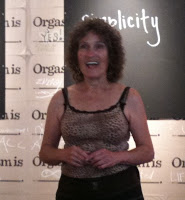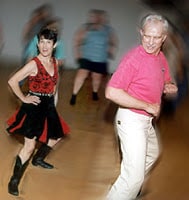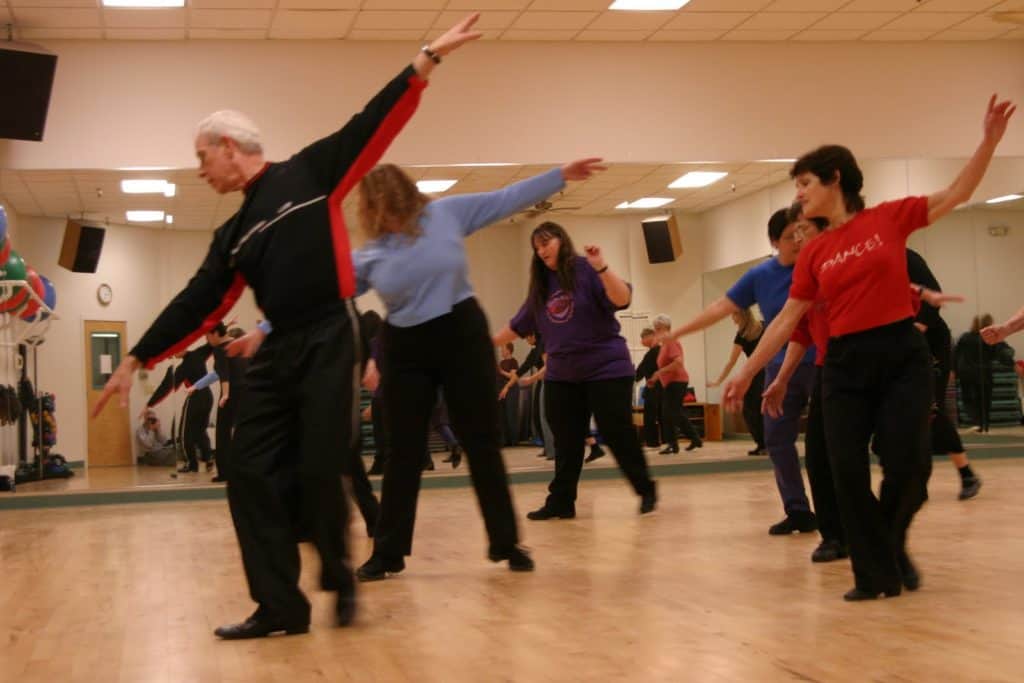Posts Tagged ‘sexual bereavement’
He Danced into My Heart: Memories and Reflections
Tomorrow, December 11, is the 12-year anniversary of the day that I met
Robert Rice and my life — personal and professional — flipped itself
upside down. Robert walked into the line dance class I was teaching, and I tried to remember to breathe.
It was lust at first sight… on my part. He, I learned later, was just looking for a new place to dance.
I didn’t know that night that I’d fall in love with this man. I only knew that his blue eyes and warm smile melted my world, and I had a sudden urge (which I resisted) to touch the chest hair that peeked from the V of his shirt. When he started to roll his hips, revealing a lifetime of dance and a self-assurance in his 64-year-old dancer’s body, I felt my own hips strain to match his rhythm. I kept forgetting the steps to the dance I was teaching.
It took nine months before I finally caressed that chest hair and our hips matched rhythm horizontally instead of vertically. I, whose motto had been “the only problem with instant gratification is that it takes too long,” pursued a man who didn’t believe in rushing anything. (Our complete story is in my first book about senior sex: Better Than I Ever Expected: Straight Talk about Sex After Sixty.)
Our first kiss didn’t happen for nine months — but once we started, we never stopped kissing.
I lost Robert to cancer on August 2, 2008 — exactly seven years after our first kiss.
Today, I made myself coffee in the coffee pot that he had used, held my cup to my cheek as he had done. I thought of the post I had written in 2010 — “I’m Going to Make You Coffee….”
I thought first that I would republish that post today. But another two-plus years have passed since I wrote that. As strong as the memories are still, and as freely as the tears flow at those memories, my grief has more layers of time cushioning it. The grief isn’t so raw and I’m not powerless or joyless from it. It still floods over me, but not all the time, and when it does, I know how to swim to the top and breathe again. My muscles are strong from practice.
For those of you who have lost a loved one, I think it’s important to share this with you: It does get easier. We all proceed in our own time frame. There’s no “right” amount of time to grieve, and anyone who tells you, “you should be over it by now” should be educated (first I wrote “pilloried,” but I changed my mind).
 I’ve also learned that we can move forward and hold onto the memories at the same time. I’m listed with three online dating sites, and I’m enthusiastic about welcoming male company into my life. I still miss Robert every day. I am not looking to replace him — couldn’t be done even if I wanted to, and I don’t want to. Any new man I get involved with will have to accept that I’m not going to take Robert’s paintings off the wall or hide the urn that holds his ashes.
I’ve also learned that we can move forward and hold onto the memories at the same time. I’m listed with three online dating sites, and I’m enthusiastic about welcoming male company into my life. I still miss Robert every day. I am not looking to replace him — couldn’t be done even if I wanted to, and I don’t want to. Any new man I get involved with will have to accept that I’m not going to take Robert’s paintings off the wall or hide the urn that holds his ashes.
I’m 69 — I bring my whole lifetime of experiences with me into whatever path I take next. That includes my memories of the man who taught me how richly I could love and be loved.
Reader: “Replacement girlfriend? Since when are wives disposable?”
I am one of the sex educators who answers question sent to the Safer Sex for Seniors website. I just answered this one and wanted to share it with you, too. It’s an issue that either has or will come up for us, unfortunately:
I’m 74 and my wife is 78. She is a resident of a care center while her hip heals from being broken and I’m still at home. She also has dementia! I’m being advised to put her into a senior home for the balance of her life and go find a replacement girlfriend.
My question is: Now that I’m at this age I’ve lost or forgotten how to find an acceptable date. My friends and family think it’s outrageous for me to replace my wife. But our state case manager is strongly backing the suggestion for a new girl in my life. Since when are wives disposable — except until death do us part?
Joan Price answers:
This is a sad and scary time for you, I understand. Your wife is badly injured and suffering from dementia, and others are advising you to let her stay in a residential facility where she can be taken care of – not temporarily, but for the rest of her life. I can understand how upset you must feel. This isn’t what you and your wife thought your golden years would be.
If you’re asking whether you should start dating, only you know whether that’s the right step for you. No one is suggesting that your wife is disposable, though they may sound that way to you in your grief.
I think those who are advising you to date are trying to let you know gently that your wife will not be returning to your home or to your relationship, and when it feels right to you to find companionship, it’s okay to do that. They’re not encouraging you to “dispose” of your wife or your vows. They’re trying to look out for your emotional well-being by letting you know that if you do want to explore finding a new relationship now or in the future, there’s nothing wrong with that.
I can see from the way you state your question, though, that it’s probably too soon to take that suggestion. Perhaps better right now would be a grief support group. Although your wife has not died, you have lost her companionship and even her presence in your life. A grief counselor or support group could be immensely valuable to you.
When you’re ready, you don’t need to feel guilty about your own need to be close to another person emotionally and sexually– that’s natural and a part of being human. You would not be trying to “replace” your wife in any way, just taking care of your own social and intimate needs. You may need to explain that to your family (or let them read this) if they still think it’s “outrageous” that you might look for a relationship.
I wish you the best. I know this is the hardest of times.
[Originally published at http://safersex4seniors.org/are-partners-with-dementia-disposable/.]
Grief Sucks
 Last night, I burst into tears in the locker room of the health club where I teach line dancing. I haven’t done that in a long time, and it surprised me, but I couldn’t control it.
Last night, I burst into tears in the locker room of the health club where I teach line dancing. I haven’t done that in a long time, and it surprised me, but I couldn’t control it.
We’re coming up on the third anniversary of Robert’s death August 2, and the dance class was a huge part of our love story. We met in my class and we fell in love there. The loss happened there, too — he announced his cancer diagnosis to the class, kept dancing even as he got weaker, until he finally couldn’t do it any more.
“Dance with Joan, and you’re dancing with me,” he wrote in a letter to the class when he needed to tell them he wouldn’t be back.
The first year after Robert died, I cried after dance class on a regular basis. I also cried in private, in public, in my car. I cried in the park, at the DMV, at Trader Joe’s, in the doctor’s office, walking along the street.
I couldn’t help it. It was like my heart caved in and squeezed out huge, unstoppable waves of sobs. I wailed, too, but at least I could hold back the screams until I was in a private place (though my neighbors came running once).
Do I miss Robert still, almost three years after his death? Only when I breathe. Only when I open or close my eyes.
 Oh, I function very well. I write, I teach my dance classes, I travel talking about senior sex — my favorite subject! How lucky I am to get to spend my day doing what I love!
Oh, I function very well. I write, I teach my dance classes, I travel talking about senior sex — my favorite subject! How lucky I am to get to spend my day doing what I love!
I laugh a lot and I make others laugh. I learn, I teach, and what I do helps other people. I do find joy in my life. It’s a good life, I know that. I’m even kinda sorta dipping my toes into dating, as you know from my (very infrequent!) posts about dating, such as this one.
But I’m not done with grief, perhaps I never will be. Those of you who have lost a loved one know the grief journey isn’t predictable. You can be doing just fine, and then, boom, you burst out crying in the locker room.
The emotional stab wounds close up, then rip open again. I know this is “normal” because grief isn’t linear, it’s cyclical. Thank goodness, each year it gets easier to cope. As my uncle, psychotherapist Larry LeShan who lost his wife of 58 years, says, “The knife still keeps stabbing, but not as deep or as often.”
I didn’t want to call this post “Grief Sucks.” I don’t like the term, and personally, I think sucking is a delightful pasttime and shouldn’t be associated with a negative experience. But hey, this post wrote itself and insisted on that title. Sometimes that happens.
As always, I welcome your comments.
Moving Forward, but Not Saying Goodbye
 |
|
| Celebrating Robert’s 71st birthday |
“The task of saying good-bye seems insurmountable,” a friend wrote after losing her husband one month ago to the same cancer — multiple myeloma — that ripped my Robert’s life from him. I wrote this to her yesterday:
On August 2, it will be 3 years since I lost Robert. But I haven’t said goodbye to him yet, nor do I plan to. I talk to him still — and sometimes he answers.
I find joy in my life (especially now that my new book has come out and I’m giving talks and interviews), and I’m still startled by the realization that I can’t come home and tell him about what happened. Then I DO come home and tell him about what happened.
Is it magical thinking? Denial? It sustains me, whatever it is. You’ll figure out how to sustain yourself through this loss eventually, but that can’t be rushed. Meanwhile, just be real with your children, and take time for yourself, even if it’s painful. You can’t skip that part.
I really, really recommend counseling — as much as you can get!
If you want to talk, or go for a walk and let any thoughts emerge that need to, I’m available. Even if you want to say, “I’m not ready yet, but I’ll let you know when I am” (which is what I had to tell people who offered early in my grief journey), I’ll welcome your message.
Love,
Joan
 I know that some of my readers have also lost their beloved partners, and I extend my invitation to listen if you want to talk. I wasn’t strong enough to do this at first, but one little step at a time, I got there. So many people helped me when I needed it most that it would give me joy to pass it forward and help others. Email me if you need to share.
I know that some of my readers have also lost their beloved partners, and I extend my invitation to listen if you want to talk. I wasn’t strong enough to do this at first, but one little step at a time, I got there. So many people helped me when I needed it most that it would give me joy to pass it forward and help others. Email me if you need to share.
I wrote the grief chapter in Naked at Our Age through tears. It was very important to include my own and reader stories of grief, because part of love and sex at our age is, sadly, that one of us will lose the other.
Last week, a woman at one of my talks bought my book, saying that she had just lost her husband. I held her hand and listened, and suggested that she read the grief chapter first. “I already did, while I was waiting. That’s what made me decide to buy it.”
I welcome your comments.




